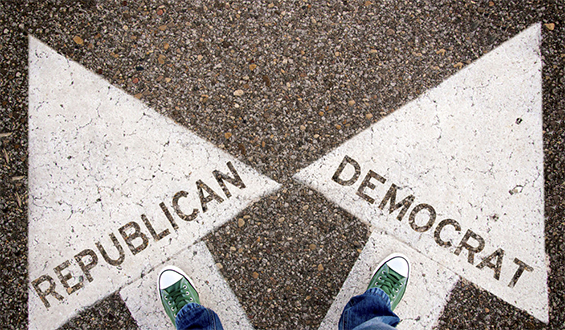
Conventional wisdom has it that political affiliation is often passed down in families from generation to generation — but a study out of Penn State University says that may not be the case.
Anya Sostek of the Pittsburgh Post-Gazette reports that less than half of the children who participated in the study knew their parents’ party choice and affiliated with that same party. The study used two sets of data, one from 1988 and one from 2006 through 2008, and both revealed similar results. Some of the progeny in the study were up to 80 years-of-age or older.
The study was published in the American Sociological Review. Christopher Ojeda, the study’s lead author, who was a political science doctoral student at Penn State when the research was completed, was surprised that the results ran contrary to the traditional ideas concerning political association.
Ojeda and co-author Peter Hatemi found a flaw in previous research, which was the assumption that grown children are even aware of their parents’ political leaning. In data from 1988, 31.2% of participants did not know when asked their mothers’ party affiliation, and 32.2% did not know their fathers’ political party. For the 2006 – 2008 data set, which asked only about moms, the figure was 33.2%.
The study, when measuring “transmission” of the same party membership between parents and children, made a distinction between children who were aware of their parents political leaning and those who were not. Mr. Ojeda, who is now a postdoctoral scholar at the Stanford Center for American Democracy at Stanford University, said:
“What we discovered is that when you account for perception, actually the transmission rate is overestimated. Imagine a parent is a Republican and has two children. One child says, ’I think my parent is a Republican and I want to be a Republican.’ One child says, ‘I think my parent is an independent and don’t want to be like my parent, I want to be a Republican.’ You might count that as transmission if you weren’t thinking about perception.”
In the 1988 Health and Lifestyles Study, 46.5% of the offspring, ages 16 to 82, perceived their mothers’ political party association and chose that same party. Only about 23% correctly identified it but aligned themselves with a different party. And 18.5% did not perceive it correctly but nevertheless ended up with the same affiliation, and 11.7% recognized it incorrectly and rejected that party. The results for fathers in that data set were similar.
The 2006 – 2008 data set, the National Longitudinal Study of Youth, questioned 3,356 families with children from 18 to 37. This study collected data only on children and their mothers. It found that 48.8% of children correctly recognized their mothers’ party and chose to affiliate with the same party, and 18% knew their mothers’ affiliation but preferred another.
A 2005 Gallup Poll found that 7 in 10 teens who participated in the questioning kept approximately the same social and political views as their mothers and fathers. Other research found taking on parents’ views early in life can influence one’s political standing as an adult, according to Rachel E. Gross of Slate. But Ojeda’s research does not line up with this notion.
“Transmission is not automatic,” Ojeda added. “You can’t just assume your kid is going to be like-minded with you.”
Medical Daily’s Ali Venosa reports the authors discovered that the more discussion about politics that took place in the home, the more likely it was that a child could identify their parents’ party leaning correctly. It did not show, however, that this would increase the possibility that the child would adopt those affiliations. Ojeda said:
“We were not surprised by this finding. Parent-child communication is a vehicle for delivering information, but it does not always deliver agreement. As we all know, political discussions can sometimes lead to consensus and they can sometimes lead to conflict.”
Entitled “Accounting for the Child in the Transmission of Party Identification,” the study underlines the fact that children make their own political identities and are not just carbon copies of mom and dad, reports PhysOrg.




